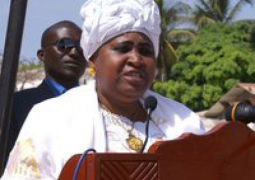The Solidarity for African Women's Rights (SOAWR) coalition had organised a three day consultative meeting on Strategies for Accelerating the ratification of the AU Protocol on the Rights of Women in Africa for Mano River Union countries at Paradise Suite Hotel. In her welcoming remarks, on behalf of SOAWR, Madame Caroline Muthoni Muriithi of Equality Now Africa Regional Office, a women's Rights organisation which is the secretariat for SOAWR, has said that solidarity for African women's rights coalition,
(SOAWR) was created by passionate women's rights activists and human rights organisations who wanted to ensure that the AU Protocol on the Rights of Women in Africa was adopted and subsequently ratified by all the African Union member states. "Its main goal has been to advocate for the universal ratification of the Protocol; to popularise the protocol and to ensure that it is implemented in all countries and becomes part of the domestic law thus ensuring that all women in Africa benefit from the rights and freedoms provided therein," she said. To achieve this goal she added, it seeks to increase public opinion and constituencies for the ratification of the AU Protocol leading to ratification and progress on national domestication; utilize the existing policy space and commitment sustained and expanded within the African Union Commission and the Pan- African Parliament to champion the Protocol; create visibility and awareness of the Protocol's provisions and the real conditions facing women and girls are actively promoted through mass media and internet based campaigns; to strengthen leadership capabilities of women's organisations to consolidate the promise of the Protocol at national and regional levels".
Madame Muthoni Muriithi, however disclosed that the AU Protocol on the Rights of Women in Africa was adopted by the African Union Heads of State and Government on 11th July 2003 and entered into force on 25th November 2005 becoming the fastest human rights instrument in Africa to come into force at such record speed. This she noted was due to the efforts of the solidarity for African womens' rights (SOAWR) campaign together with partners and women activists across the continent. "SOAWR has in the last four years made great strides in its quest to speed up the ratification of the African Union (AU) Protocol on the Rights of Women. "Today, with a growing membership of 30 organisations in 18 African countries, SOAWR has continued to mount pressure on African Union member states. As we speak 25 out of the 53 African countries have ratified the protocol with Liberia and Zimbabwe being the latest to ratify, she concluded".
For her parting Mrs Mary Small, facilitator to the program said that (SOAWR) is a continental coalition made up of 29 Civil Society Organisations and Development partners working towards the promotion and protection of women's Human Rights in Africa.
She pointed out that since its inauguration in 2004, SOAWR's main area of focus has been to get those countries that have not yet ratified the Protocol to the African Charter on Human and Peoples' Rights on the Rights of Women in Africa to do so with a sense of urgency, while at the same time encouraging states that have ratified to domesticate and implement it in their respective countries, she added.
Madame Small further stated that, despite the widespread ratification by African States of the African Charter on Human and Peoples' Rights, the Convention on the Elimination of all Forms of Violence Against Women and of the instruments that constitute the International Bill of Rights (Universal Declaration on Human Rights, International Covenant on Civil and Political Rights and International Covenant on Economic, Social and Cultural Rights), gender issues barely appeared in political agendas across Africa. Through these different encounters and partnerships with local bodies, she revealed, it has been made abundantly clear that to tackle the underlying causes of violence, it is necessary to support and strengthen local initiatives and organisations focused on ending violence on a sub-regional basis.


